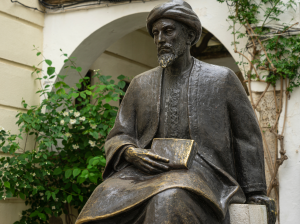Maimonides, known as Rambam, or Rabbi Moshe ben Maimon, was one of the greatest Jewish and secular scholars of all time. He was born in Spain in 1135, and later fled to North Africa due to the Crusades, and after a short time in Israel he finally settled in Egypt. Already a world-renowned Talmudic scholar and philosopher, he became the chief court doctor to Saladin
Maimonides authored vast volumes on Jewish law, philosophy and medicine. He dedicated his life to uplifting the spirits of the great numbers of Jews under persecution and forced conversion. He so inspired the Jews of Yemen during a period of persecution, that his name was added to the daily kaddish prayer by the Yemenite community. His gravestone was inscribed “From Moses to Moses (Maimonides) there hasn’t been another Moses.”
In 1999, a group of secular Jewish and gentile professors and scholars voted Maimonides as the greatest Jew in the last millennia (besting R’ Israel Baal Shem Tov and Theodor Herzl, the next two runners up).
In his commentary to the Mishna, Maimonides compiled the “13 Root Principles of Belief,” which has been widely accepted throughout the traditional Jewish world as the most valid summary of the basic beliefs of Judaism.
These principles are published at the end of the morning prayers in most Siddur prayer books, in concise form as the “Ani Maamin” prayer. They were also made into a famous poem, known as “Yigdal”.
These 13 principles are divided into three categories:
- The definition of Jewish belief in G-d as Creator, One G-d who is all powerful and all knowing, in charge of what happens in our lives, and His eternal existence, with no physical body, above time, all prayers should be directed to Him.
- The concept of prophecy, that G-d speaks to human beings, revealed His will through prophecy at Sinai, the truth of the prophecy of Moses and other prophets. The Torah we have today is the same Torah from Sinai and is unchanging.
- The concepts of reward and punishment, the messianic era and eventual revival of the deceased.
I would highly recommend you study these principles in depth, as they will profoundly affect your understanding of Judaism and give you a true appreciation of what we believe and why.
Sincerely,
Rabbi Yerachmiel Fried


